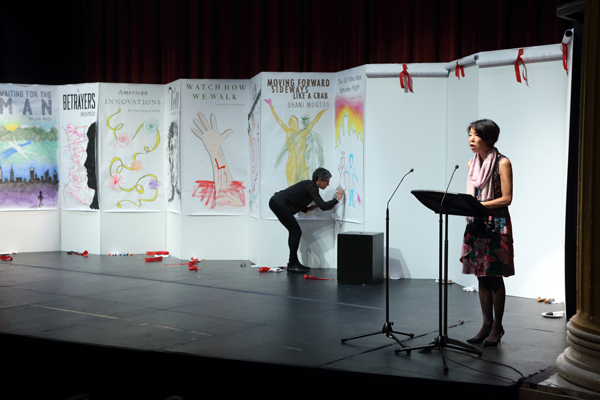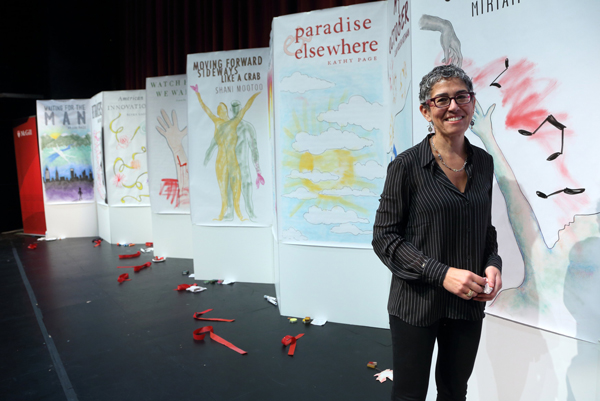
By Laura Cameron
Canadian literary fiction got a major financial boost last week when Scotiabank announced it was making a contribution that will double the amount of prize money awarded to the winner and finalists of the 2014 Giller Prize.
Students, faculty, administrators, press, and members of the Montreal literary community filled Moyse Hall on the morning of Sept. 16, to watch the presentation of the longlist for Canada’s richest literary award for fiction.
The event was co-hosted by McGill’s Faculty of Arts. Dean Christopher Manfredi pointed out that this is only the second time the longlist has been presented outside of Toronto. And there must be few venues more appropriate than the McGill Arts Building: as Principal Suzanne Fortier observed in her welcome address, “some of Canada’s most talented artists and authors … made McGill their home,” including Irving Layton, Leonard Cohen and Marian Engel: all alumni of the Faculty of Arts.
Jack Rabinovitch, who founded the award in 1994 in honour of his late wife, Doris Giller, is another McGill alumnus. Rabinovitch was at the event and announced that the prize purse this year would be $100,000 for the winner and $10,000 for each of the shortlisted authors.
The twelve books longlisted for the 2014 Scotiabank Giller Prize are:
Waiting for the Man by Arjun Basu (ECW Press)
The Betrayers by David Bezmozgis (HarperCollins Canada)
American Innovations by Rivka Galchen (HarperCollins Canada)
Tell by Frances Itani (HarperCollins Canada)
Watch How We Walk by Jennifer LoveGrove (ECW Press)
Us Conductors by Sean Michaels (Random House Canada)
Moving Forward Sideways Like a Crab by Shani Mootoo (Doubleday Canada)
The Girl Who Was Saturday Night by Heather O’Neill (HarperCollins Canada)
Paradise and Elsewhere by Kathy Page (Biblioasis)
My October by Claire Holden Rothman (Penguin Canada)
All My Puny Sorrows by Miriam Toews (Knopf Canada)
The Ever After of Ashwin Rao by Padma Viswanathan (Random House Canada)
The shortlist will be announced on Monday, Oct. 6, and the winner will be revealed at a gala ceremony to honour the finalists on Monday, Nov. 9.

The list was presented through a collaborative performance by author Denise Chong and graphic recorder Sara Heppner-Waldston. Heppner-Waldston had produced a large poster for each of the twelve longlisted books, which she unfurled as Chong announced the title, author and publisher. Then, while Chong read a passage from the book, Heppner-Waldston embellished, altered, coloured or filled in the image. The end result was an accordion-shaped row across the stage of colourful, provocative artwork that expressed the themes and mood of this year’s list. The title fonts on the posters matched those on the book jackets, but otherwise the designs were Heppner-Waldston’s own, inspired by her sense of the texts. “It was really a fun, creative challenge,” she said.
The artwork and performance generated a lot of discussion over champagne and hors d’oeuvres at the reception in the Arts Building lobby. Nathalie Cooke, a professor of Canadian literature at McGill, remarked that the posters were “a wonderful invitation into the books.” Janet Blachford, a Montreal writer and McGill alumna who has enjoyed a long affiliation with the University, agreed that it was a “beautiful presentation full of charm.”
The winner of last year’s Giller Prize was a collection of short stories, Lynn Coady’s Hellgoing. Short stories are a particularly strong tradition in Canadian literature, and the longlist this year features two story collections: Rivka Galchen’s American Innovations and Kathy Page’s Paradise and Elsewhere.

This year’s longlist also foregrounds the strength of Canadian women writers: nine of the twelve longlisted titles are by women. “I was thrilled to see that women are in the ascendency,” commented Grace Chaki, a McGill alumna who was a close friend of Doris Giller. This list is “a fitting honour to Doris,” Chaki added.
Members of the McGill community were also happy to find four Montreal authors – Arjun Basu, Sean Michaels, Heather O’Neill, and Claire Holden Rothman – on the list. Professor Cooke remarked that it was good to see “a new generation” of Montrealers “establishing a track record” for themselves. Making it onto the list this year were Basu’s and Michaels’s first novels, and O’Neill’s and Rothman’s second; O’Neill’s Lullabies for Little Criminals garnered many honours and was the winner of the 2007 Canada Reads competition, and Rothman’s The Heart Specialist was longlisted for the Giller Prize in 2009.
“I think the list is fantastic,” said a beaming Rabinovitch after the event. “I’d like to emphasize that they [the jury] read 162 books, and so to be among the top 12 is outstanding.”
